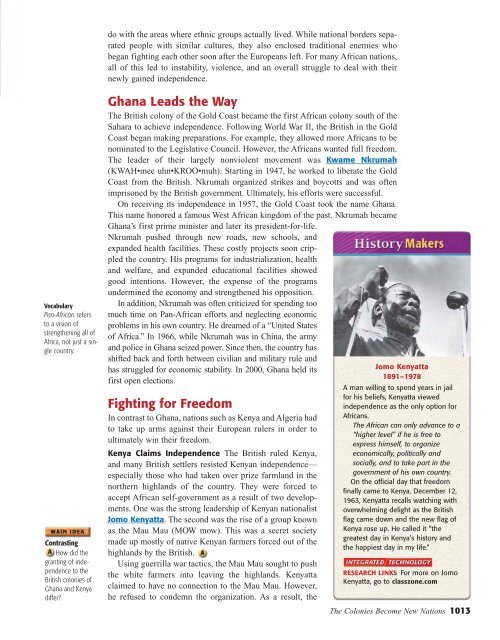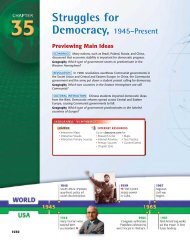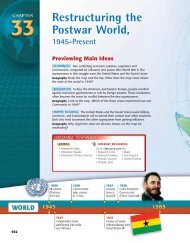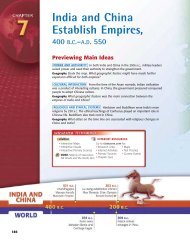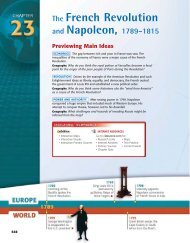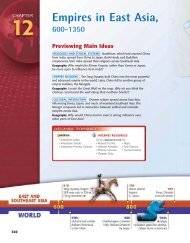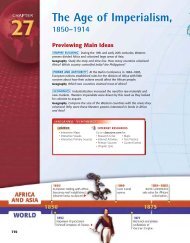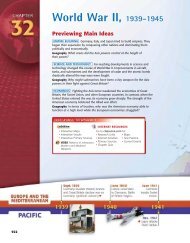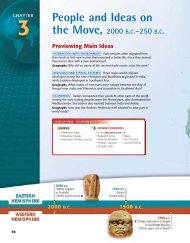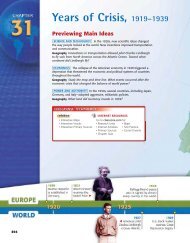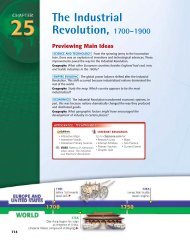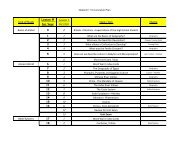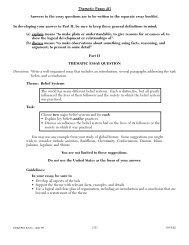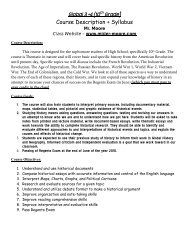Chapter 34 - First
Chapter 34 - First
Chapter 34 - First
Create successful ePaper yourself
Turn your PDF publications into a flip-book with our unique Google optimized e-Paper software.
Vocabulary<br />
Pan-African refers<br />
to a vision of<br />
strengthening all of<br />
Africa, not just a single<br />
country.<br />
Contrasting<br />
How did the<br />
granting of independence<br />
to the<br />
British colonies of<br />
Ghana and Kenya<br />
differ?<br />
do with the areas where ethnic groups actually lived. While national borders separated<br />
people with similar cultures, they also enclosed traditional enemies who<br />
began fighting each other soon after the Europeans left. For many African nations,<br />
all of this led to instability, violence, and an overall struggle to deal with their<br />
newly gained independence.<br />
Ghana Leads the Way<br />
The British colony of the Gold Coast became the first African colony south of the<br />
Sahara to achieve independence. Following World War II, the British in the Gold<br />
Coast began making preparations. For example, they allowed more Africans to be<br />
nominated to the Legislative Council. However, the Africans wanted full freedom.<br />
The leader of their largely nonviolent movement was Kwame Nkrumah<br />
(KWAH•mee uhn•KROO•muh). Starting in 1947, he worked to liberate the Gold<br />
Coast from the British. Nkrumah organized strikes and boycotts and was often<br />
imprisoned by the British government. Ultimately, his efforts were successful.<br />
On receiving its independence in 1957, the Gold Coast took the name Ghana.<br />
This name honored a famous West African kingdom of the past. Nkrumah became<br />
Ghana’s first prime minister and later its president-for-life.<br />
Nkrumah pushed through new roads, new schools, and<br />
expanded health facilities. These costly projects soon crippled<br />
the country. His programs for industrialization, health<br />
and welfare, and expanded educational facilities showed<br />
good intentions. However, the expense of the programs<br />
undermined the economy and strengthened his opposition.<br />
In addition, Nkrumah was often criticized for spending too<br />
much time on Pan-African efforts and neglecting economic<br />
problems in his own country. He dreamed of a “United States<br />
of Africa.” In 1966, while Nkrumah was in China, the army<br />
and police in Ghana seized power. Since then, the country has<br />
shifted back and forth between civilian and military rule and<br />
has struggled for economic stability. In 2000, Ghana held its<br />
first open elections.<br />
Fighting for Freedom<br />
In contrast to Ghana, nations such as Kenya and Algeria had<br />
to take up arms against their European rulers in order to<br />
ultimately win their freedom.<br />
Kenya Claims Independence The British ruled Kenya,<br />
and many British settlers resisted Kenyan independence—<br />
especially those who had taken over prize farmland in the<br />
northern highlands of the country. They were forced to<br />
accept African self-government as a result of two developments.<br />
One was the strong leadership of Kenyan nationalist<br />
Jomo Kenyatta. The second was the rise of a group known<br />
as the Mau Mau (MOW mow). This was a secret society<br />
made up mostly of native Kenyan farmers forced out of the<br />
highlands by the British.<br />
Using guerrilla war tactics, the Mau Mau sought to push<br />
the white farmers into leaving the highlands. Kenyatta<br />
claimed to have no connection to the Mau Mau. However,<br />
he refused to condemn the organization. As a result, the<br />
Jomo Kenyatta<br />
1891–1978<br />
A man willing to spend years in jail<br />
for his beliefs, Kenyatta viewed<br />
independence as the only option for<br />
Africans.<br />
The African can only advance to a<br />
“higher level” if he is free to<br />
express himself, to organize<br />
economically, politically and<br />
socially, and to take part in the<br />
government of his own country.<br />
On the official day that freedom<br />
finally came to Kenya, December 12,<br />
1963, Kenyatta recalls watching with<br />
overwhelming delight as the British<br />
flag came down and the new flag of<br />
Kenya rose up. He called it “the<br />
greatest day in Kenya’s history and<br />
the happiest day in my life.”<br />
RESEARCH LINKS For more on Jomo<br />
Kenyatta, go to classzone.com<br />
The Colonies Become New Nations 1013


